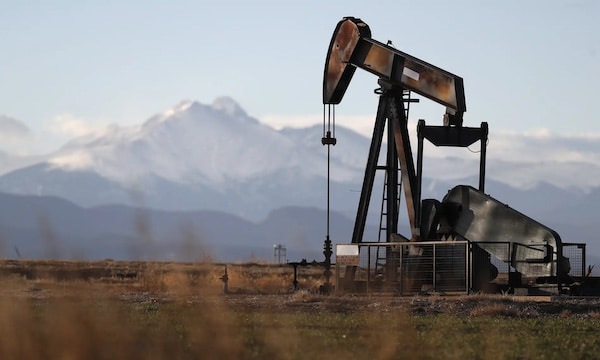The world’s big banks have handed nearly $7tn (£5.6tn) in funding to the fossil fuel industry since the Paris agreement to limit carbon emissions, according to research.
In 2016, after talks in Paris, 196 countries signed an agreement to limit global heating as a result of carbon emissions to at most 2C above preindustrial levels, with an ideal limit of 1.5C to prevent the worst impacts of a drastically changed climate.
Many countries have since promised to reduce carbon emissions, but the latest research shows private interests continued to funnel money to oil, gas and coal companies, which have used it to expand their operations.
Eight in 10 of the world’s most eminent climate scientists now foresee at least 2.5C of global heating, according to the results of a Guardian survey published last week—an outcome expected to lead to devastating consequences for civilization.
Researchers for the banking on climate chaos report, now in its 15th edition, analysed the world’s top 60 banks’ underwriting and lending to more than 4,200 fossil fuel firms and companies causing the degradation of the Amazon and Arctic.
Those banks, they found, gave $6.9tn in financing to oil, coal and gas companies, nearly half of which—$3.3tn—went towards fossil fuel expansion. Even in 2023, two years after many large banks vowed to work towards lowering emissions as part of the Net Zero Banking Alliance, bank finance for fossil fuel companies was $705bn, with $347bn going towards expansion, the report says.
U.S. banks were the biggest financiers of the fossil fuel industry, contributing 30% of the total $705bn provided in 2023, the report found. JP Morgan Chase gave the most of any bank in the world, providing $40.8bn to fossil fuel companies in 2023, while Bank of America came in third. The world’s second biggest financier of fossil fuels was the Japanese bank Mizuho, which provided $37.1bn.
London-based Barclays was Europe’s biggest fossil fuel financier, with $24.2bn, followed by Spain’s Santander at $14.5bn and Germany’s Deutsche Bank with $13.4bn. Overall, European banks stumped up just over a quarter of the total fossil fuel financing in 2023, according to the report.
Tom BK Goldtooth, the executive director of the Indigenous Environmental Network, which co-authored the study, said:
Financiers and investors of fossil fuels continue to light the flame of the climate crisis. Paired with generations of colonialism, the fossil fuel industry and banking institutions’ investment in false solutions create unlivable conditions for all living relatives and humanity on Mother Earth.
As Indigenous peoples, we remain on the frontlines of the climate catastrophe, and the fossil fuel industry targets our lands and territories as sacrifice zones to continue their extraction. Capitalism and its extraction-based economy will only perpetuate more harm and destruction against our Mother Earth and it must come to an end.
Critics of the report said its methodology, which relied on investigating deals reported by financial market data companies such as Bloomberg and Refinitiv, meant researchers did not have a detailed view of what was being financed, and by whom.
Specifically, syndicated loans, bond issues and underwriting arrangements often involved several banks with varying levels of exposure. And financing to fossil fuel companies to fund transition technology projects could not be distinguished from financing for new oil wells, they said.
Spokespeople for Barclays, Bank of America, JP Morgan Chase, Deutsche Bank and Santander all emphasised that their organisations were supporting energy sector clients’ transitions toward more sustainable business models. Mizuho declined a request for comment.
I hope you appreciated this article. Before you move on, I wanted to ask if you would consider supporting the Guardian’s journalism as we enter one of the most consequential news cycles of our lifetimes in 2024.
With the potential of another Trump presidency looming, there are countless angles to cover around this year’s election—and we’ll be there to shed light on each new development, with explainers, key takeaways and analysis of what it means for America, democracy and the world.
From Elon Musk to the Murdochs, a small number of billionaire owners have a powerful hold on so much of the information that reaches the public about what’s happening in the world. The Guardian is different. We have no billionaire owner or shareholders to consider. Our journalism is produced to serve the public interest—not profit motives.
And we avoid the trap that befalls much U.S. media: the tendency, born of a desire to please all sides, to engage in false equivalence in the name of neutrality. We always strive to be fair. But sometimes that means calling out the lies of powerful people and institutions—and making clear how misinformation and demagoguery can damage democracy.
From threats to election integrity, to the spiraling climate crisis, to complex foreign conflicts, our journalists contextualize, investigate and illuminate the critical stories of our time. As a global news organization with a robust U.S. reporting staff, we’re able to provide a fresh, outsider perspective—one so often missing in the American media bubble.
Around the world, readers can access the Guardian’s paywall-free journalism because of our unique reader-supported model. That’s because of people like you. Our readers keep us independent, beholden to no outside influence and accessible to everyone—whether they can afford to pay for news, or not.
Damien Gayle is an environment correspondent for the Guardian.

